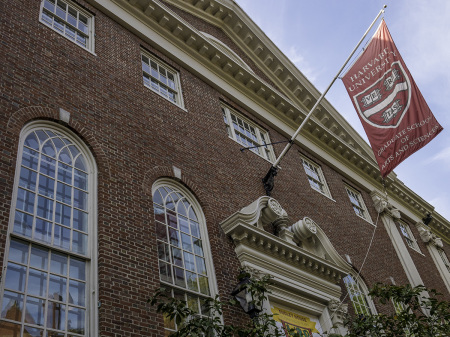'Dark money': $13 billion funneled to Ivy League, US universities by Qatar, authoritarian regimes

A new report reveals that top colleges and universities that received billions of dollars in foreign donations from countries with authoritarian regimes and failed to report these funds to the U.S. Department of Education also saw a deterioration of free speech and a rise in antisemitism on their campuses.
The Institute for the Study of Global Antisemitism and Policy has published a report titled “The Corruption of the American Mind: How Concealed Foreign Funding of Higher Education in the United States Predicts the Erosion of Democratic Values and Antisemitic Sentiment on Campus.” Released in November, the report has received renewed attention following last month’s testimonies of the presidents of top Ivy League academic institutions before the U.S. House of Representatives regarding rising antisemitism on their campuses.
“At least 100 American colleges and universities illegally withheld information on approximately $13 billion in undocumented contributions from foreign governments, many of which are authoritarian,” the report stated. The research chronicled how antisemitic rhetoric and incidents were more prevalent at institutions that had received such contributions than those that did not.
The report identified the largest source of undocumented funding for colleges and universities as the Gulf nation of Qatar, which gave $2,706,240,869 to U.S. universities between 2014 and 2019. Two of the other three countries that donated more than a billion dollars in undocumented money to colleges and universities, China and Saudi Arabia, are also well-known authoritarian, anti-democratic regimes. Those two countries gave $1,237,952,112 and $1,065,205,930, respectively, to U.S. universities.
Other top donor countries to American institutions of higher education include: England ($1,464,906,771), Bermuda ($899,593,972), Canada ($898,160,656), Hong Kong, China, ($887,402,529), Japan ($655,954,776), Switzerland ($619,899,445), India ($539,556,490), Germany ($442,475,605) and the United Arab Emirates ($431,396,357).
Meanwhile, Carnegie Mellon University was listed as the school that received the most undocumented funding, totaling $1,473,036,665 in the five-year period. Data included in the study is based on an investigation from the U.S. Department of Education.
Cornell University was the only other institution of higher education to receive more than a billion dollars in undocumented money ($1,289,433,376), while Harvard University ($894,533,832), the Massachusetts Institute of Technology ($859,071,692), Texas A&M University ($521,455,050), Yale University ($495,851,474), Northwestern University ($402,316,221), Johns Hopkins University ($401,035,647), Georgetown University ($379,950,511) and the University of Chicago ($364,544,338) rounded out the list of top 10 beneficiaries of such funding.
Brigham Young University, a prominent Mormon school, got $323,509,863 in unreported funding, while the Catholic Church-affiliated University of Notre Dame received $46,652,439. Westminster Theological Seminary accumulated $1,467,620 from undocumented sources, while America’s flagship Jewish institution, Yeshiva University, received $297,397.
Additional information in the report included results from a survey that asked college students how often certain antisemitic ideas were expressed on their campuses. The results demonstrated that support for antisemitic ideas was more common on campuses that had received undocumented money than those that did not.
Based on responses from college students to the survey, schools that received undocumented money had higher frequencies of students “saying Israel has no right to exist as a Jewish country,” “saying that the U.S. government only supports Israel because of Jewish money,” “drawing comparisons of contemporary Israeli policies to that of the Nazis,” “boycotting Jewish organizations because they have a connection to Israel” and “saying American Jews care more about Israel than the U.S.”
A subsequent report from the Institute for the Study of Global Antisemitism and Policy, published last month, lists additional authoritarian and/or Middle Eastern countries that have provided funding to U.S. universities.
The document, titled “Networks of Hate: Qatari Paymasters, Soft Power and the Manipulation of American Democracy,” details how Kuwait provided the 16th-highest amount of academic funding, while Russia gave the 30th-highest amount, and Iraq donated the 43rd-highest. Israel also provides such funding, ranking 25th based on the amount donated.
The problem of antisemitism has found itself in the spotlight following the Oct. 7 attacks in Israel perpetrated by the terrorist group Hamas. As explained in the Institute for the Study of Global Antisemitism and Policy’s “Networks of Hate” report, Qatar has donated regularly to Hamas over the past 16 years.
Last month’s “Networks of Hate” report also illustrates how Qatar’s influence in American education extends beyond donations. The Qatar Foundation for Education, Science and Community Development has developed partnerships with several American universities, including Texas A&M University, Virginia Commonwealth University, Georgetown University, Northwestern University and Carnegie Mellon University.
An agreement between Texas A&M University and the Qatar Foundation that governs the school’s campus located in the Middle Eastern nation includes an article that requires the faculty and students of both Texas A&M and Texas A&M’s Qatar Campus to “abide by the applicable laws and regulations of the State of Qatar” and “respect the cultural, religious and social customs of the State of Qatar.”
The report warns that the agreement leads to “restrictions on political expression, sexuality and other matters that conflict with norms of academic freedom.”
Ryan Foley is a reporter for The Christian Post. He can be reached at: [email protected]






















